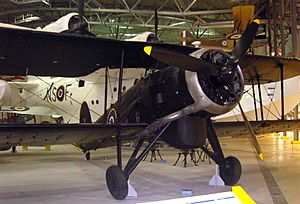No. 119 Squadron RAF facts for kids
Quick facts for kids No. 119 Squadron RAF |
|
|---|---|
| Active | 1 Jan 1918 - 6 Dec 1918 13 Mar 1941 - 17 Apr 1943 19 Jul 1944 – 25 May 1945 |
| Country | |
| Branch | |
| Motto(s) | By night and day |
| Insignia | |
| Squadron Badge heraldry | A sword, the point downwards, and an anchor in saltire |
| Squadron Codes | NH (Jul 1944 - May 1945) |
No. 119 Squadron RAF was a special group of planes and pilots in the Royal Air Force (RAF). They flew during the Second World War. This squadron was part of RAF Coastal Command, which protected ships and hunted enemy submarines.
No. 119 Squadron was unique. It was the only RAF group to fly certain types of large "flying boats." These were planes that could land and take off from water. They used the Short G class and Short C class flying boats.
Contents
History of No. 119 Squadron
First Formation: World War I
No. 119 Squadron first started on January 1, 1918. This was during World War I. It was formed at RAF Andover in England. The plan was for it to be a "day bomber" unit. This meant its planes would drop bombs during the day.
The squadron used different planes to practice. These included the Airco DH.4 and Airco DH.9. They trained at places like RAF Duxford and RAF Thetford. However, the war ended before the squadron could fly any missions. So, it was officially closed down on December 6, 1918.
Reforming for World War II
Flying Boats in Action
The squadron was started again on March 13, 1941. This was during World War II. It became part of RAF Coastal Command. This part of the RAF was in charge of protecting the seas around Britain. They looked for enemy ships and submarines.
No. 119 Squadron first used three Short G class and two Short C class flying boats. These planes were named Clio and Cordelia. In June 1941, they switched to the Catalina Mk.Ib. This was another type of flying boat.
The squadron moved to RAF Pembroke Dock in August. They had problems with their planes there. So, they couldn't fly missions for a while. In April 1942, they moved to RAF Lough Erne. There, they got new Catalina Mk.IIIa planes. In September, they started using the Short Sunderland Mks.II and IIIs. These were also large flying boats. The squadron was closed down again on April 17, 1943.
Biplanes Join the Fight
On July 19, 1944, No. 119 Squadron was formed for a third time. This time, they used different planes called biplanes. Biplanes have two sets of wings, one above the other. They took over planes from another group, No. 415 Squadron RCAF. These planes were Fairey Albacore Mk.Is.
The squadron flew from places like RAF Manston and RAF Bircham Newton. Their main job was to patrol the seas. They hunted for German E-boats and R-boats. These were small, fast enemy boats. In October 1944, they also started hunting German midget-submarines. These were very small submarines.
In January 1945, the squadron got new planes. These were the Fairey Swordfish Mk.III. These planes had special radar to help find submarines. They destroyed three midget-submarines. The squadron flew its last mission on May 8, 1945. It was closed down for good on May 25, 1945.
One of the Swordfish planes flown by the squadron is still around today. It's a Swordfish Mk.III, called NF370. You can see it at the Imperial War Museum Duxford. It still has the original markings of No. 119 Squadron.
Aircraft Used by the Squadron
No. 119 Squadron flew many different types of aircraft over its history. Here is a list of the planes they used:
| From | To | Aircraft | Variant |
|---|---|---|---|
| Jan 1918 | Nov 1918 | Various | |
| Sep 1918 | Dec 1918 | Airco DH.9 | |
| Mar 1941 | Oct 1941 | Short G class | S.26/M |
| Apr 1941 | Aug 1941 | Short C class | S.23/M |
| Jun 1941 | Jul 1941 | Consolidated Catalina | Mk.Ib |
| May 1942 | Oct 1942 | Consolidated Catalina | Mk.IIIa |
| Sep 1942 | Apr 1943 | Short Sunderland | Mk.III |
| Jul 1944 | Feb 1945 | Fairey Albacore | Mk.I |
| Jan 1945 | May 1945 | Fairey Swordfish | Mk.III |
 | John T. Biggers |
 | Thomas Blackshear |
 | Mark Bradford |
 | Beverly Buchanan |


